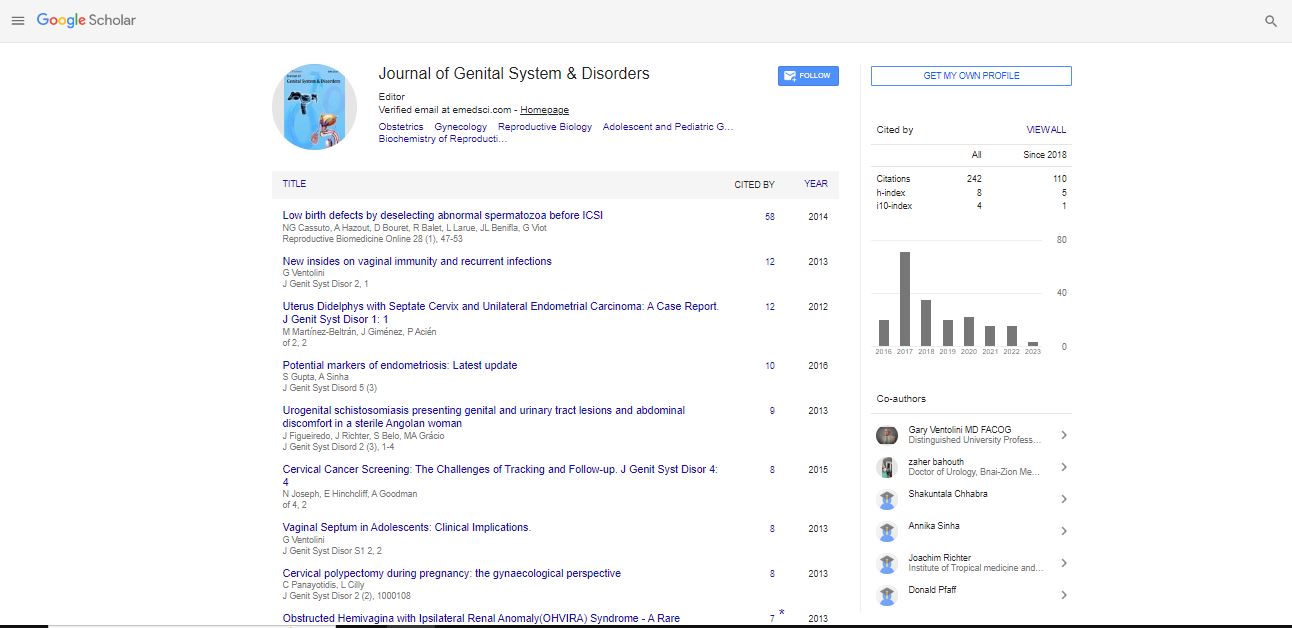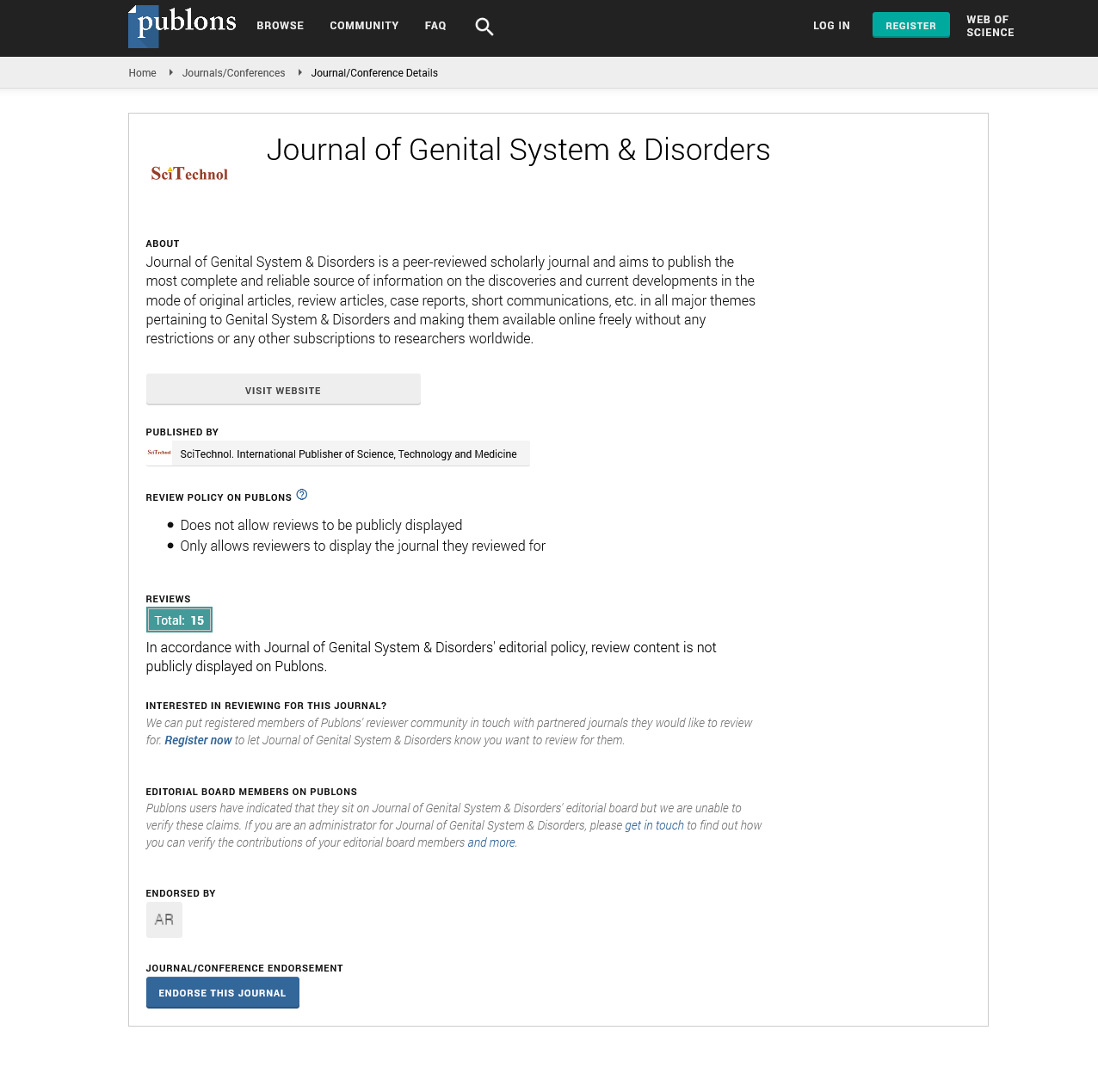Opinion Article, J Genit Syst Disord Vol: 12 Issue: 1
Reproductive Immunology: The Immune System's Function in Reproduction
Robert Maleki*
Department of Immunology, University of Adelaide, Adelaide, Australia
*Corresponding Author: Robert Maleki
Robert Maleki, Department of Immunology, University of
Adelaide, Adelaide, Australia;
E-mail: malekirobert@gmail.com
Received date: 22 February, 2023, Manuscript No. JGSD-23-96119;
Editor assigned date: 24 February, 2023, Pre QC No. JGSD-23-96119 (PQ);
Reviewed date: 10 March, 2023, QC No. JGSD-23-96119;
Revised date: 17 March, 2023, Manuscript No. JGSD-23-96119 (R);
Published date: 24 March, 2023, DOI: 10.4172/ 2325-9728.1000269
Citation: Maleki R (2023) Reproductive Immunology: Immune System's Function in Reproduction. J Genit Syst Disord 12:1.
Description
Reproductive immunology is a field of study that focuses on understanding the complex relationship between the immune system and reproduction. The immune system, which is primarily responsible for defending the body against harmful pathogens, plays an important role in fertility, pregnancy, and reproductive health. In recent years, there has been growing interest in reproductive immunology due to its potential implications for fertility treatments, pregnancy complications, and reproductive health disorders. In this article, we will take an indepth look at reproductive immunology, including its key concepts, research findings, and clinical applications.
Immune system and reproduction
The immune system is composed of various cells, tissues, and organs that work together to defend the body against invading pathogens. However, the immune system's role in reproduction is more complex than just defense. It is also involved in maintaining a balance between tolerance and rejection to ensure successful reproduction.
Tolerance in reproduction: The immune system needs to tolerate the presence of sperm, embryos, and the fetus, which are technically foreign to the maternal immune system. The female reproductive tract has unique immune mechanisms that facilitate this tolerance. For example, the cervix produces mucus that acts as a physical barrier against pathogens but also allows sperm to pass through. The uterus has specialized immune cells, such as regulatory T cells, that help regulate the immune response and prevent rejection of the embryo/ fetus.
Immune rejection in reproduction: On the other hand, the immune system also plays a role in preventing the implantation of defective embryos or embryos that may pose a threat to the mother's health. The immune cells in the uterus, such as natural killer cells, can recognize and eliminate abnormal embryos, preventing them from implanting and leading to pregnancy loss.
Immunological factors in fertility and infertility
Reproductive immunology has revealed that immunological factors can impact fertility and infertility in various ways. Understanding these factors can help in diagnosing and treating fertility issues.
Autoimmune Disorders and Fertility Autoimmune disorders, where the immune system mistakenly attacks the body's own tissues, can affect reproductive health. For example, conditions like antiphospholipid syndrome, which cause the immune system to attack the placenta, can lead to recurrent pregnancy loss. Other autoimmune disorders such as lupus, rheumatoid arthritis, and thyroid disorders can also affect fertility.
Immunological Factors in Unexplained Infertility
In some cases, infertility may not have a clear underlying cause. Recent research has suggested that immunological factors could play a role in unexplained infertility. Abnormal immune responses, such as increased inflammation or activation of immune cells in the reproductive tract, may impair fertility by affecting sperm function or embryo implantation.
Immune Response to Assisted Reproductive Technologies (ART) Assisted Reproductive Technologies (ART), such as In Vitro Fertilization (IVF), has revolutionized fertility treatments. However, ART procedures can trigger an immune response in the body. The manipulation of embryos, eggs, and sperm in the lab, as well as the use of foreign materials, can activate the immune system and potentially affect the success of ART procedures. Researchers are studying the immunological aspects of ART to improve its outcomes.
Immunological challenges in pregnancy: Pregnancy presents unique immunological challenges, as the mother's immune system needs to tolerate the presence of the semi-allogeneic fetus while still protecting against infections.
Immunomodulatory therapies in pregnancy
In certain cases, immunomodulatory therapies may be used during pregnancy to manage immunological challenges. For example, in cases of recurrent pregnancy loss or implantation failure, immunosuppressive or immunomodulatory medications may be prescribed to modulate the immune response and improve pregnancy outcomes. However, the use of these therapies in pregnancy requires careful consideration of potential risks and benefits and should be done under the guidance of a qualified healthcare professional.
Reproductive immunology is a multidisciplinary field that seeks to unravel the complex relationship between the immune system and reproduction. It has significant implications for fertility treatments, pregnancy complications, and reproductive health disorders. Understanding the immune system's role in reproduction, identifying immunological factors that impact fertility and pregnancy, and developing targeted immunotherapies are areas of active research in reproductive immunology. Further advancements in this field are expected to improve our understanding of reproductive health and may lead to more personalized and effective treatments for individuals facing fertility issues and pregnancy complications.
 Spanish
Spanish  Chinese
Chinese  Russian
Russian  German
German  French
French  Japanese
Japanese  Portuguese
Portuguese  Hindi
Hindi 
